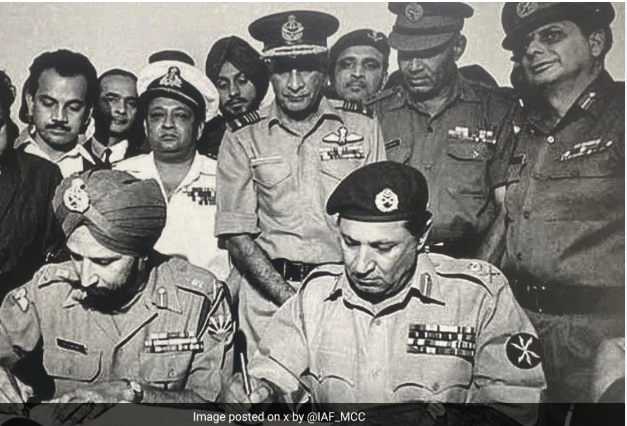Virendra Pandit
New Delhi: Itching to return to their East Pakistan era, Bangladesh’s ungrateful politicians, now part of the ruling Islamist-military nexus, have claimed that their country, not India, defeated Islamabad in the 1971 war that liberated Dhaka.
Their claims came, even though more than 93,000 Pakistani soldiers abjectly surrendered before the Indian Army liberated the people jackbooted by Islamabad in Dhaka. Crushed, killed, or raped, millions of East Pakistanis took refuge in India, of whom many did not return, continued to smuggle in many more, and have since changed the demography and politics of several Indian states.
Led by Muhammed Yunus, a puppet of Jamaat-e-Islami and Hifazat-e-Islam, the Bangladeshi ruling crowd now openly says they would soon ‘invade’ India and reinstate the Muslim reign they lost in 1957.
According to the breakaway Muslim nation’s publication Prothom Alo, Bangladesh’s politicians on Monday condemned Prime Minister Narendra Modi’s Facebook post on “Victory Day” that referred to the surrender of the Pakistan Army in 1971 as “India’s historic victory,” as they called it “unacceptable,” and “not a friendly expression.”
PM Modi’s social media post on India’s victory in the Indo-Pakistani war of 1971 sparked strong reactions in Bangladesh.
Asif Nazrul, the Bangladesh interim government’s law adviser, was reported as having said that “16 December 1971, was the day of Bangladesh’s victory. India was an ally in this victory, nothing more.”
Many more Bangladeshi politicians joined the India-bashing spree on social media.
Salahuddin Ahmed, a member of the Bangladesh Nationalist Party’s (BNP’s) standing committee, told Prothom Alo, “Bangladesh gained its independence after nine months of war. The struggle of the people of Bangladesh should not be viewed differently.”
“The independence and sovereignty of a nation should be respected with mutual respect and dignity.”
In his post, PM Modi lauded the Indian Army, and wrote, “Today, on Vijay Diwas, we honor the courage and sacrifices of the brave soldiers who contributed to India’s historic victory in 1971. Their selfless dedication and unwavering resolve safeguarded our nation and brought glory to us. This day is a tribute to their extraordinary valor and their unshakable spirit. Their sacrifices will forever inspire generations and remain deeply embedded in our nation’s history.”
Hasnat Abdullah, an organizer of the Anti-Discrimination Student Movement, also criticized PM Modi’s saying in his own Facebook post, “This was Bangladesh’s Liberation War. That war was for Bangladesh’s independence from Pakistan. But Modi claimed the war to be only of India and their achievement. The existence of Bangladesh is defied in their speeches.”
India’s portrayal of Bangladesh’s Liberation War as its achievement is perceived as a direct threat to Bangladesh’s independence, sovereignty, and territorial integrity, he claimed.
Ruhin Hossain Prince, general secretary of the Communist Party of Bangladesh (CPB), told Prothom Alo, “I strongly condemn Modi’s statement. It is unacceptable.”
Shahadat Hossain, a spokesperson for the country’s 12-party alliance, allied with the BNP, said, “The people of Bangladesh fought and won the war for independence.” “The statement of India’s prime minister is not a friendly expression. Such comments arise from an authoritarian mindset. “
Zunaid Saki, the chief coordinator of the Ganasamhati Andolon, told Prothom Alo, “India does not truly appreciate or consider the significance of Bangladesh’s struggle for independence.” “This is once again proven by Narendra Modi’s post.”
The 13-day-long Indo-Pakistani War of 1971, the third military conflict between the two countries, occurred during the ongoing Bangladesh Liberation War in East Pakistan. It began on December 3, 1971, and ended with Pakistan’s surrender in Dhaka on December 16, 1971.
The war was initiated by Pakistan’s Operation Chengiz Khan, a series of pre-emptive airstrikes on Indian airbases. It forced India to declare war on Pakistan, leading to its formal involvement in the Bangladesh Liberation War in support of Bengali nationalist forces fighting for East Pakistan’s independence.
India’s entry resulted in fierce military engagements between Indian and Pakistani forces on both eastern and western fronts.
Eventually, India secured a decisive victory, and the Pakistan Eastern Command signed the Instrument of Surrender on December 16, 1971, in Dhaka. This event marked the creation of Bangladesh as an independent nation, formerly East Pakistan. Around 93,000 Pakistani soldiers were taken as prisoners of war by the Indian Army and later released.
The Instrument of Surrender was officially signed at Race Course Ground, now known as Suhrawardy Udyan in Dhaka, between Indian Army’s Lieutenant-General Jagjit Singh Aurora, the General Officer Commanding-in-Chief of India’s Eastern Command, and Lieutenant-General A A K Niazi, Commander of Pakistan’s Eastern Command.

